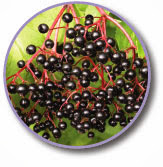Now that cold and flu season has arrived, many people are concerned with how to best prevent and eliminate these all too common infections.
A comprehensive approach should always be taken when it comes to building and maintaining a healthy body and immune system, but for now let’s briefly discuss an incredible herb that is frequently used today in the treatment of common colds and flus. It’s Latin name is Sambucas nigra, but it is more commonly known as black elderberry.
Black elderberry belongs to a group of plants called Elders. The medicinal properties of species from the Elder family have long been recognized and utilized by healers, herbalists, and medical practitioners throughout the world. More than two thousand years ago, Hippocrates was noted for calling the elder tree his “medicine chest.” The antimicrobial, antiviral, anti-inflammatory, and antioxidant properties of black elderberry make it a great medicine to help shorten duration and reduce severity of the common cold and flu. The German Commission E has reported that constituents contained within this plant are effective in the relief of cold and fever, especially when used in combination with other immune-enhancing nutrients.
In a recent study published in BMC Complementary and Alternative Medicine, researchers analyzed a standardized black elderberry extract (Rubini) for its antibacterial and antiviral effects against various types of bacteria and viruses that are common culprits in upper respiratory tract infections. Results of this study indicated antimicrobial activity against Gram-positive bacteria (Streptococcus pyogenes, Group C and G Streptococci) and Gram-negative bacteria (Branhamella catarrhalis), as well as inhibitory activity against human influenza viruses.
Other studies, including two small double-blind placebo-controlled trials, have provided evidence that elderberry extract effectively inhibits influenza A and B strains when individuals take it orally within the first 2 days of flu symptoms.
With extensive historical use and a growing body of scientific evidence supporting its benefits, black elderberry should be considered an option in treatment of the common cold and flu.
Dr. Shana McQueen
Source:
http://www.ncbi.nlm.nih.gov/pmc/articles/PMC3056848/?tool=pubmed
http://www.altmedrev.com/publications/12/1/25.pdf
A comprehensive approach should always be taken when it comes to building and maintaining a healthy body and immune system, but for now let’s briefly discuss an incredible herb that is frequently used today in the treatment of common colds and flus. It’s Latin name is Sambucas nigra, but it is more commonly known as black elderberry.
Black elderberry belongs to a group of plants called Elders. The medicinal properties of species from the Elder family have long been recognized and utilized by healers, herbalists, and medical practitioners throughout the world. More than two thousand years ago, Hippocrates was noted for calling the elder tree his “medicine chest.” The antimicrobial, antiviral, anti-inflammatory, and antioxidant properties of black elderberry make it a great medicine to help shorten duration and reduce severity of the common cold and flu. The German Commission E has reported that constituents contained within this plant are effective in the relief of cold and fever, especially when used in combination with other immune-enhancing nutrients.
In a recent study published in BMC Complementary and Alternative Medicine, researchers analyzed a standardized black elderberry extract (Rubini) for its antibacterial and antiviral effects against various types of bacteria and viruses that are common culprits in upper respiratory tract infections. Results of this study indicated antimicrobial activity against Gram-positive bacteria (Streptococcus pyogenes, Group C and G Streptococci) and Gram-negative bacteria (Branhamella catarrhalis), as well as inhibitory activity against human influenza viruses.
Other studies, including two small double-blind placebo-controlled trials, have provided evidence that elderberry extract effectively inhibits influenza A and B strains when individuals take it orally within the first 2 days of flu symptoms.
With extensive historical use and a growing body of scientific evidence supporting its benefits, black elderberry should be considered an option in treatment of the common cold and flu.
Dr. Shana McQueen
Source:
http://www.ncbi.nlm.nih.gov/pmc/articles/PMC3056848/?tool=pubmed
http://www.altmedrev.com/publications/12/1/25.pdf







